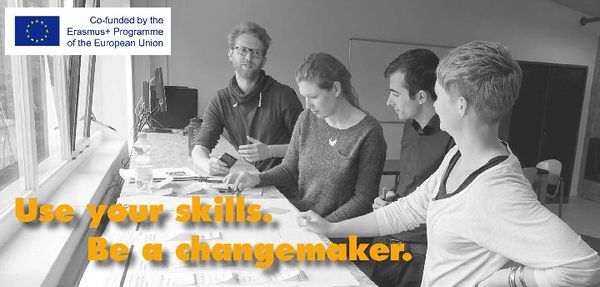Online Course From Idea to Implementation: Difference between revisions
(Created page with " This output is an online resource and all materials and intellectual products are publicly accessible via our seminar wiki. This overview page serves the ERASMUS+ Project Re...") |
No edit summary |
||
| Line 1: | Line 1: | ||
This output is an online resource and all materials and intellectual products are publicly accessible via our seminar wiki. This overview page | [[File:Visual Output 1.jpg|thumb|600px|right|Community Learning for Local Change - A blended learning model]] | ||
'''From Idea to Implementation''' | |||
The course | |||
This output is an online resource and all materials and intellectual products are publicly accessible via our seminar wiki. This overview page gives access to all learning materials developed with the framework of the CLLC ERASMUS project. | |||
This comprises a series of recorded lectures and lecture materials, as well as a template for developing a business plan in the field of social innovation. | |||
The course materials and the assignment are designed for students and/or practitioners from all disciplines. Prior to this course, participants should have gone through a design thinking process, or a similar innovation process, so that they can join with a clear social innovation idea that they would like to advance. With help of the course materials, participants can bring their ideas further and develop them into a business plan. The business plan could become a foundation for seeking start-up capital or other support. | |||
All materials are published as open educational resources and can be further used both by other instructors and by learners. | All materials are published as open educational resources and can be further used both by other instructors and by learners. | ||
https:// | == Course Materials == | ||
===Assignment=== | |||
* Assignment outline: [https://ilias.hfwu.de/goto.php?target=file_30933_download&client_id=hfwu The Business Plan Template] | |||
Phase A: Designing an Organisational Form | === Phase A: Designing an Organisational Form === | ||
A.1: Introduction to the seminar: From Idea to Implementation - What does it imply? | A.1: Introduction to the seminar: From Idea to Implementation - What does it imply? | ||
A.2: Understanding the start-up phase: Methodologies for supporting start-ups | A.2: Understanding the start-up phase: Methodologies for supporting start-ups | ||
Revision as of 04:25, 12 October 2021
From Idea to Implementation
This output is an online resource and all materials and intellectual products are publicly accessible via our seminar wiki. This overview page gives access to all learning materials developed with the framework of the CLLC ERASMUS project.
This comprises a series of recorded lectures and lecture materials, as well as a template for developing a business plan in the field of social innovation.
The course materials and the assignment are designed for students and/or practitioners from all disciplines. Prior to this course, participants should have gone through a design thinking process, or a similar innovation process, so that they can join with a clear social innovation idea that they would like to advance. With help of the course materials, participants can bring their ideas further and develop them into a business plan. The business plan could become a foundation for seeking start-up capital or other support.
All materials are published as open educational resources and can be further used both by other instructors and by learners.
Course Materials
Assignment
- Assignment outline: The Business Plan Template
Phase A: Designing an Organisational Form
A.1: Introduction to the seminar: From Idea to Implementation - What does it imply?
A.2: Understanding the start-up phase: Methodologies for supporting start-ups A.3: Ownership models and their legal environment A.4.: Cooperation models Phase B: Product and Service Design B.1: Introduction to product and service design B.2: How to conduct a market research Phase C: Developing the Financial Plan
C.1: Financing the start-up phase
C.2: How money works in business
Phase D: Promotion and Selling Strategies
D.1: Distribution Channels D.2: Creative use of advertising and promotion
Phase E: Management
E.1: Staffing and Leading E.2: Quality Management and Impact Evaluation E.3: Risk Management
